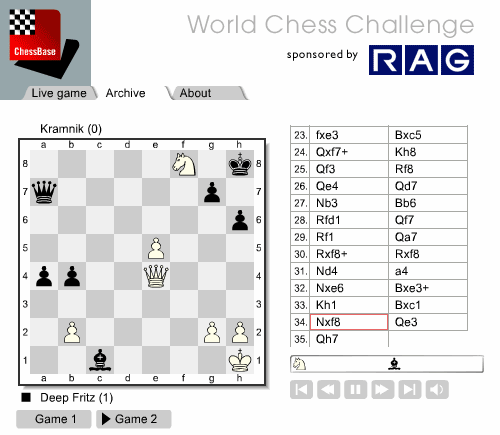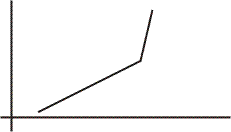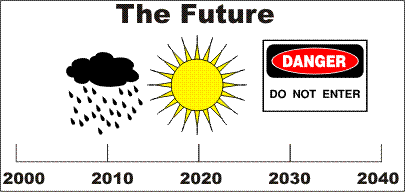
Dynamics

|
Generational Dynamics |
| Forecasting America's Destiny ... and the World's | |
| HOME WEB LOG COUNTRY WIKI COMMENT FORUM DOWNLOADS ABOUT | |
With three games yet to go, the match spotlights the strengths of computers and humans.
It's called The World Chess Challenge -- Man vs. Machine.
In one corner is the human world chess champion, Vladimir Kramnik.
In the other corner is the computer world chess champion, Deep Fritz 10.
Before the match began last Saturday, Kramnik characterized the match as follows: "My match against the Fritz-10 computer program may be decisive, as it may well be the last chance that a human has to defeat the machine."
He explained, "It is very important for me, but I understand that the task in front of me is very hard, as computers are playing very strongly, and they improve each year. It is also a decisive match, as maybe it will be the last chance for a human being to defeat a machine. But even though I am very enthusiastic I know that it will be very difficult, as the computer is capable of calculating an incredible number of moves."
Indeed, Deep Fritz can examine 1.8 million chess positions per second, while a human being can only hope to think about a few dozen per minute.
How can a human being have any hope of winning a game? Because humans have intuition and instinct, capabilities that are hard to program in a computer.
You can review all three games so far by going to the Spiegel Online Man vs Machine site. At the same site, you'll also be able to follow the remaining games live, as they're being played in Bonn, Germany. The remaining games will be played on Friday, Sunday and Tuesday, December 1, 3 and 5, with each game beginning at 3 pm in Germany (9 am, New York time).
 |
According to experts, Kramnik outplayed the computer for most of the first two games, and played equally well as the computer in the third game.
So why is the computer ahead, two games to one? Because of an incredible blunder, an oversight by Kramnik in game 2.
 |
Kramnik had played very carefully and was in a drawn position, when he was hit by "chess blindness," and overlooked mate in one! This kind of blunder is very rare among chess grandmasters, but it does happen. After all, they're only human!
This illustrates one of the many advantages that computers have over humans: They don't get chess blindness. They get don't tired. They don't get cute. They just compute their best move and play it, with computer-like efficiency.
 |
Chess is a game with a long history, centuries old, and the search for a chess playing machine is almost as old. Chess history is replete with stories of attempts to build automata that could play chess, carnival hucksters that fascinated gullible townfolk with large mechanical contraptions that could mysteriously make moves on chessboards, but which really contained a chess playing dwarf inside. The most famous was "The Turk," an enormous contraption that toured Europe and America in the late 18th and early 19th centuries, defeating such luminaries as Benjamin Franklin and Napoleon, and apparently fooling everyone. Edgar Allen Poe wrote that something isn't right about the Turk, since it occasionally made mistakes and a true machine would play flawless chess and would always win.
When the field of "artificial intelligence" (AI) was invented in the 1950s, the game of chess was considered a goal within reach. In 1957, AI researchers expected a chess-playing computer to be world champion within ten years or so.
And yet by 1970, the best chess-playing computer was little better than a beginner. The researchers were unable to develop algorithms and heuristics that could mimic the reasoning of a chess master or grandmaster.
Nonetheless, today's chess-playing computers play at world champion level. How did computers get so good in 30 years? It turns out that the chess-playing algorithms used in today's computers are really not much different from the algorithms used in 1970. So why are they doing so much better today? It's because computers are much more powerful. A chess-playing algorithm could only look 3 or 4 moves ahead in 1970, but can look 8 to 12 moves ahead today, because computers are much more powerful.
This example illustrates, in a sense, how much of a failure artificial intelligence research has been. Back in the 50s, 60s, and 70s, researchers were expecting to find elegant algorithms and heuristics that would make computers match humans in a variety of areas -- game playing, voice recognition, natural language processing, computer vision, theorem proving, and so forth. But the fact is that AI researchers have failed to do so in every area.
Instead, they've had to fall back onto "brute force" algorithms. The phrase "brute force" was meant to be pejorative, but now it's really become the only game in town. What "brute force" means is to use the power of the computer to try every possibility until one works.
Kramnik believes that his match with Deep Fritz is decisive because it may "be the last chance for a human being to defeat a machine." That's because computers get more powerful each year. They double in computational power every 18 months. Soon they'll be far more powerful than the human brain.
As we discussed in conjunction with the release of the movie I, Robot in 2004, supercomputers will be as intelligent as human beings by 2010 or so, and autonomous super-intelligent desktop or mobile computers will be surging in the 2020s, and will take over a variety of jobs: a computer plumber, a computer nursemaid, a computer soldier.
Even more striking is that the Army is planning to deploy its "Future Combat System" which calls for autonomous robot soldiers by 2014. In fact, the development of super-intelligent computers is proceeding rapidly in countries around the work.
 |
By the 2020s, intelligent robots will also be doing scientific research to develop improved versions of themselves, so that intelligent robots will eventually be far more intelligent than human beings. The point in time where intelligent robots are essentially in control of their own destiny is called "The Singularity," because there will be a bend in the exponential growth technology curve, as shown in the adjoining graphic. There is no way to have any idea what's going to happen to the world after that point.
From the point of view of Generational Dynamics, the human race is about to face its greatest challenge in history. First, we'll see the "clash of civilizations" world war. Then we'll see a period "easy living," as intelligent computerized devices, from computer nurse to computer plumber, will take over all the difficult jobs we hate to do. Then the Singularity will occur, and humans will no longer be the most intelligent entities on earh.
 |
My own estimate is that the Singularity will occur between 2025 and
2030, though other analysts' estimates put it as late as 2040 or
2050.
(30-Nov-06)
Permanent Link
Receive daily World View columns by e-mail
Donate to Generational Dynamics via PayPal
Web Log Summary - 2016
Web Log Summary - 2015
Web Log Summary - 2014
Web Log Summary - 2013
Web Log Summary - 2012
Web Log Summary - 2011
Web Log Summary - 2010
Web Log Summary - 2009
Web Log Summary - 2008
Web Log Summary - 2007
Web Log Summary - 2006
Web Log Summary - 2005
Web Log Summary - 2004
Web Log - December, 2016
Web Log - November, 2016
Web Log - October, 2016
Web Log - September, 2016
Web Log - August, 2016
Web Log - July, 2016
Web Log - June, 2016
Web Log - May, 2016
Web Log - April, 2016
Web Log - March, 2016
Web Log - February, 2016
Web Log - January, 2016
Web Log - December, 2015
Web Log - November, 2015
Web Log - October, 2015
Web Log - September, 2015
Web Log - August, 2015
Web Log - July, 2015
Web Log - June, 2015
Web Log - May, 2015
Web Log - April, 2015
Web Log - March, 2015
Web Log - February, 2015
Web Log - January, 2015
Web Log - December, 2014
Web Log - November, 2014
Web Log - October, 2014
Web Log - September, 2014
Web Log - August, 2014
Web Log - July, 2014
Web Log - June, 2014
Web Log - May, 2014
Web Log - April, 2014
Web Log - March, 2014
Web Log - February, 2014
Web Log - January, 2014
Web Log - December, 2013
Web Log - November, 2013
Web Log - October, 2013
Web Log - September, 2013
Web Log - August, 2013
Web Log - July, 2013
Web Log - June, 2013
Web Log - May, 2013
Web Log - April, 2013
Web Log - March, 2013
Web Log - February, 2013
Web Log - January, 2013
Web Log - December, 2012
Web Log - November, 2012
Web Log - October, 2012
Web Log - September, 2012
Web Log - August, 2012
Web Log - July, 2012
Web Log - June, 2012
Web Log - May, 2012
Web Log - April, 2012
Web Log - March, 2012
Web Log - February, 2012
Web Log - January, 2012
Web Log - December, 2011
Web Log - November, 2011
Web Log - October, 2011
Web Log - September, 2011
Web Log - August, 2011
Web Log - July, 2011
Web Log - June, 2011
Web Log - May, 2011
Web Log - April, 2011
Web Log - March, 2011
Web Log - February, 2011
Web Log - January, 2011
Web Log - December, 2010
Web Log - November, 2010
Web Log - October, 2010
Web Log - September, 2010
Web Log - August, 2010
Web Log - July, 2010
Web Log - June, 2010
Web Log - May, 2010
Web Log - April, 2010
Web Log - March, 2010
Web Log - February, 2010
Web Log - January, 2010
Web Log - December, 2009
Web Log - November, 2009
Web Log - October, 2009
Web Log - September, 2009
Web Log - August, 2009
Web Log - July, 2009
Web Log - June, 2009
Web Log - May, 2009
Web Log - April, 2009
Web Log - March, 2009
Web Log - February, 2009
Web Log - January, 2009
Web Log - December, 2008
Web Log - November, 2008
Web Log - October, 2008
Web Log - September, 2008
Web Log - August, 2008
Web Log - July, 2008
Web Log - June, 2008
Web Log - May, 2008
Web Log - April, 2008
Web Log - March, 2008
Web Log - February, 2008
Web Log - January, 2008
Web Log - December, 2007
Web Log - November, 2007
Web Log - October, 2007
Web Log - September, 2007
Web Log - August, 2007
Web Log - July, 2007
Web Log - June, 2007
Web Log - May, 2007
Web Log - April, 2007
Web Log - March, 2007
Web Log - February, 2007
Web Log - January, 2007
Web Log - December, 2006
Web Log - November, 2006
Web Log - October, 2006
Web Log - September, 2006
Web Log - August, 2006
Web Log - July, 2006
Web Log - June, 2006
Web Log - May, 2006
Web Log - April, 2006
Web Log - March, 2006
Web Log - February, 2006
Web Log - January, 2006
Web Log - December, 2005
Web Log - November, 2005
Web Log - October, 2005
Web Log - September, 2005
Web Log - August, 2005
Web Log - July, 2005
Web Log - June, 2005
Web Log - May, 2005
Web Log - April, 2005
Web Log - March, 2005
Web Log - February, 2005
Web Log - January, 2005
Web Log - December, 2004
Web Log - November, 2004
Web Log - October, 2004
Web Log - September, 2004
Web Log - August, 2004
Web Log - July, 2004
Web Log - June, 2004